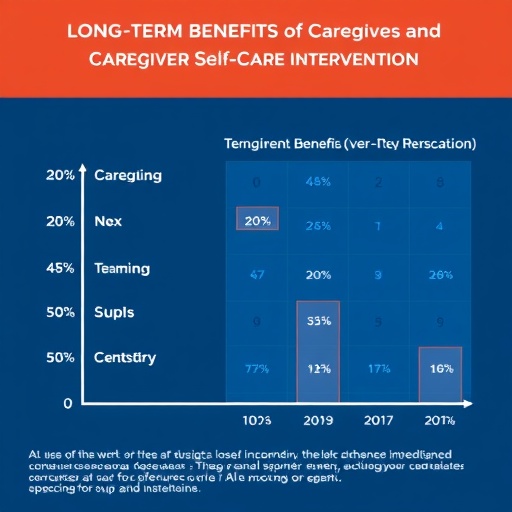In a groundbreaking study published in “BMC Nursing,” researchers Riegel, Quinn, and Hirschman delve into the complexities surrounding caregiver support in the context of heart failure management. As heart failure remains a pervasive condition that affects millions globally, the stress and emotional burden on caregivers cannot be overstated. This research presents a comprehensive longitudinal analysis that highlights the enduring benefits of self-care interventions designed specifically for these caregivers.
The emotional and physical toll on caregivers is often overlooked in the healthcare landscape. They not only manage their loved ones’ medical needs but also deal with their stress, anxiety, and fatigue. This ongoing burden can lead to significant health problems for caregivers themselves, often resulting in what is termed “caregiver burnout.” The study aims to address this issue by assessing the effectiveness of self-care interventions, offering new insights into how support can be sustained over time.
Self-care interventions represent a shift in focus towards empowering caregivers. The researchers implemented an evidence-based approach, allowing caregivers to engage in activities that promote their well-being. By focusing on self-care strategies, the study aims to mitigate the negative impacts associated with caregiving, such as depression and chronic stress. These interventions are carefully curated to include education on coping strategies, healthy lifestyle choices, and stress management techniques.
What makes this study particularly significant is its longitudinal design, which allows the researchers to not only observe the immediate effects of self-care but also the long-term benefits that may ensue. By employing a comparative analysis, the team was able to measure the outcomes of caregivers who received interventions against those who did not. The longitudinal aspect enables an in-depth understanding of how sustained engagement in self-care practices influences overall caregiver health over time.
Preliminary findings in the study underscore the positive correlation between self-care interventions and improved well-being among caregivers. Many participants reported enhanced emotional resilience, reduced levels of anxiety, and a greater ability to manage their caregiving roles effectively. The researchers noted that caregivers who actively engaged in self-care strategies were substantially less likely to experience burnout compared to their counterparts who did not have access to these resources.
As the healthcare industry continues to evolve, integrating support for caregivers within the patient care framework is becoming increasingly vital. Traditional healthcare models often fail to account for the critical role caregivers play, leading to a systemic oversight in addressing their unique needs. This research advocates for a paradigm shift, encouraging healthcare providers to recognize and support caregiver well-being as part of comprehensive patient care.
The implications of this study extend far beyond individual health outcomes. By shining a light on the importance of caregiver support, the researchers are contributing to a broader discourse regarding healthcare policy and resource allocation. As the demand for healthcare continues to rise, it is essential that systems are put in place to ensure that caregivers are not neglected but rather empowered to thrive alongside those they care for.
Moreover, the findings from this study could pave the way for the development of additional resources and programs tailored to meet caregiver needs. By identifying the most effective self-care practices, healthcare professionals can design targeted interventions that maximize benefits. Such initiatives could include workshops, peer support groups, and access to mental health resources, ensuring caregivers have the tools necessary to sustain their well-being.
The significance of this research is further enhanced by its focus on the unique challenges faced by caregivers of adults with heart failure. Given the chronic nature of this condition, caregivers often endure prolonged periods of stress and emotional strain. Laying the groundwork for future studies, this research not only addresses immediate concerns but also explores how various external factors, such as socioeconomic status, can influence the effectiveness of self-care interventions.
As we look to the future, the need for ongoing research in this field is paramount. Understanding the longevity of the benefits associated with self-care interventions will require continuous exploration and validation. The researchers acknowledge that while their findings are promising, the dynamic nature of caregiving and individual circumstances necessitate further investigation to enhance our understanding comprehensively.
In conclusion, Riegel, Quinn, and Hirschman’s work serves as a clarion call for the recognition of caregivers’ indispensable roles in healthcare. Their comprehensive longitudinal analysis provides critical insights into how self-care interventions can not only enrich caregivers’ lives but also positively impact those under their care. This study represents a meaningful step towards advocating for the necessary support systems that can uplift caregivers, ultimately leading to better health outcomes for both caregivers and patients alike.
In light of the significant implications of this research, the broader healthcare community is encouraged to embrace these findings, integrating self-care interventions into routine caregiver support. Implementing such strategies, hospitals and healthcare providers can ensure caregivers are equipped and empowered, leading to healthier communities and enhancing the overall quality of life for those affected by heart failure and similar chronic conditions.
Subject of Research: Self-care interventions for caregivers of adults with heart failure
Article Title: A longitudinal comparative analysis of sustained benefit of a self-care intervention for caregivers of adults with heart failure.
Article References:
Riegel, B., Quinn, R. & Hirschman, K.B. A longitudinal comparative analysis of sustained benefit of a self-care intervention for caregivers of adults with heart failure.
BMC Nurs (2025). https://doi.org/10.1186/s12912-025-04123-4
Image Credits: AI Generated
DOI:
Keywords: caregiver support, self-care interventions, heart failure, caregiver burnout, healthcare policy, longitudinal study.




